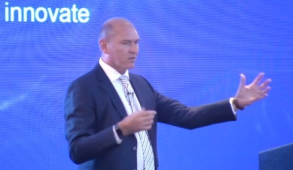HFMA summer conference: crucial time for recovery
 Sir James (pictured), who is also chief executive of Northumbria Healthcare NHS Foundation Trust, said the service had delivered ‘fantastic progress in adversity’ by virtually eradicating waiting lists of more than two years. By the end of July patients waiting longer than 104 weeks is forecast to hit about 1,800, of which 230 are ‘capacity’ patients. The rest are too complicated to move or who have chosen not to move, he added.
Sir James (pictured), who is also chief executive of Northumbria Healthcare NHS Foundation Trust, said the service had delivered ‘fantastic progress in adversity’ by virtually eradicating waiting lists of more than two years. By the end of July patients waiting longer than 104 weeks is forecast to hit about 1,800, of which 230 are ‘capacity’ patients. The rest are too complicated to move or who have chosen not to move, he added.
The NHS is moving into the next phase, where it is targeting ending waits of more than 78 weeks by April 2023, before moving on to eliminate waits of more than 52 weeks by March 2025. It will also face greater scrutiny on whether it is providing value for money.
Sir James said that while the initial programme was largely about delivering operations, the next stage would be focused on outpatients.
‘When you unpack the maths, only 3% of the waiting list will end with an inpatient operative episode; 80% of the waiting list is all about outpatients and diagnostics. The real bulk of the patient experience sits with us changing outpatients. The first bit was about getting over the hurdle, which was quite surgically orientated, but let’s not lose sight of the long game in all this.’
There are huge regional variations, he said. And it was possible for some to deliver elective recovery ‘there or thereabouts’ this year, including London, South East, North East and Yorkshire regions. However, there was some concern about the 11 million missing patients who should be in the system. ‘Depending on how they arrive back into the system will have a huge impact on our rate of recovery.’
Getting to no-one waiting longer than 78 weeks would be a much bigger and more complicated task. The centre would help by formally pairing organisations and systems, and would try to build up the opportunities for patients to see clinicians remotely, potentially as part of a national virtual outpatients service.
He added that the service must focus on the patient experience. ‘In all this, let’s not lose sight of the patient. It could become very mechanical. Let’s try to start to use technology that’s in use in parts of the NHS that allows patients to take control, see where they are, communicate with the clinical team, book appointments and tests. That’s happening in parts of the NHS – it needs to happen everywhere.’
In the next few weeks, the service will have to take a step back to take stock, and he believed this will be a regular feature of the 78-week phase. He added: ‘We really need to separate urgent and elective care and protect the streams as much as we can. That’s what a lot of the TIF [targeted investment fund] investment was about. Thinking of the maths of that, one month’s elective disruption is an 8.3% hit – you’ll never recover. We’ve got to make sure we’re as resilient as we can be through the winter.
'And we’ve really got to go for outpatients, and see outpatients as the solution to liberate clinicians to spend time on the things they want to.’
Related content
The Institute’s annual costing conference provides the NHS with the latest developments and guidance in NHS costing.
The value masterclass shares examples of organisations and systems that have pursued a value-driven approach and the results they have achieved.